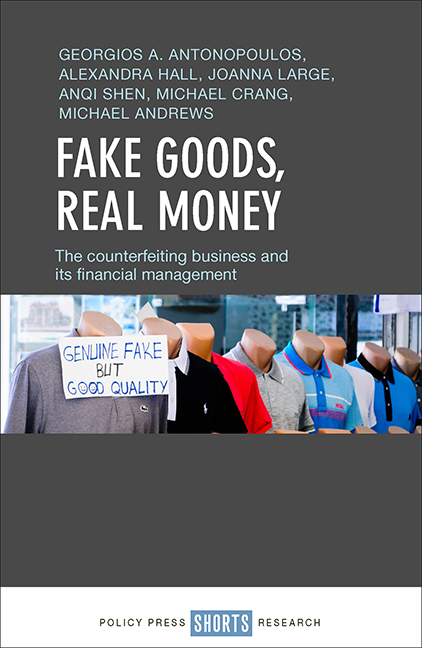Book contents
five - Conclusion and future directions
Published online by Cambridge University Press: 12 April 2022
Summary
This exploratory research has begun to shed light on an area of illicit financing to which academic research has yet to pay much attention. This comes at the same time as international policymakers and law enforcement officials are becoming more concerned about the financial implications of a growing international trade in counterfeit goods. The global market in counterfeit goods is now regarded as the largest illicit market in the world, yet little research has been done to expose its complex dynamics. Indeed, researching and investigating illicit markets and illicit financial flows is a particularly difficult task. The variation in the size and scope of flows, the connection of money to various markets, the lack of cross-sector collaboration, state and business corruption, the transnational characteristic of flows and their spatio-legal differentiation, and the existence of shell companies and offshore entities all present difficult problems for researchers.
As a result of these and other factors, such as time and resource constraints, the current study is limited, but this highlights the need for further interdisciplinary and cross-sector work. For example, there are certain drawbacks to the methodological approach outlined earlier: the short-term nature of the ethnographic observations; reliance on qualitative measures and the opinions of a non-representative sample of interviewees; and the use of data derived from interviews with members of the authorities. The quality of the data from the authorities is dependent upon resource restrictions, the competency of agents, organisational priorities and wider political priorities (see Kinzig, 2004; Levi, 2004; Hobbs and Antonopoulos, 2014). However, while recognising that further in-depth research over a longer time frame is needed, this research, by focusing on the nature and dynamics of illicit financing related to counterfeit markets in the UK and China, has produced some important initial key findings to help illuminate the financial mechanisms and implications of the trade in counterfeit goods. This concluding chapter will summarise the main research findings and offer some possible future directions for further research into the financing of the counterfeit trade.
Key project findings
The main findings in relation to the financing of counterfeit markets in the UK evidence the relative ease with which actors looking to become involved in the supply of counterfeit goods can find start-up capital to begin a counterfeiting venture, especially for a small-scale project or where capital already exists within a parallel business.
- Type
- Chapter
- Information
- Fake Goods, Real MoneyThe Counterfeiting Business and its Financial Management, pp. 65 - 76Publisher: Bristol University PressPrint publication year: 2018



